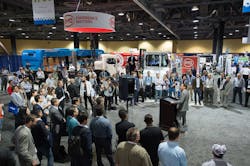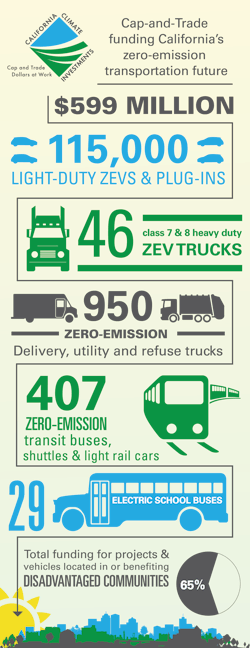California celebrates emissions-funding milestone at ACT Expo
LONG BEACH, CA. California often is considered a dirty word among truckers.
That is partly due to the state’s aggressive truck and bus emissions regulations, which truckers say adds costs to an already complex regulatory environment at the federal level.
Throughout the Advanced Clean Transportation (ACT) Expo, numerous officials from the California Air Resources Board (CARB) made it explicitly clear the agency would not be deterred from its future emissions-reduction plans, even if the Trump administration takes steps that appear to undermine their efforts.
At the same time, they also came to the May 1-4 event to join with the industry to celebrate collaborative accomplishments.
Specifically, CARB announced California Climate Investments (CCI) in zero-emission vehicles have reached $599 million since it launched in 2013. The CCI is a statewide program that shifts billions of dollars from a cap-and-trade program to spur clean vehicles of all sizes.
Robertson noted that total funding from various programs offered throughout the state totals in the billions of dollars.
The CCI funding thus far has yielded 46 heavy-duty, zero-emission trucks and almost 1,000 hybrid or electric trucks in the delivery, utility and refuse spaces. It also has supported 100,000 light-duty, zero-emission vehicles and plug-in hybrid-electrics.
A release from CARB said CCI-backed demonstration projects are putting electricity and hydrogen vehicles side-by-side with existing diesel models to more clearly determine their benefits and capabilities in real-world situations.
Among the companies joining CARB for the announcement was BYD, which earlier this year partnered with Daylight Transportation and government agencies to put into service 27 zero-emission electric yard trucks. That project received $9 million in CCI funding and $10.2 million other financial assistance.
CCI “helps bring these ultra-clean vehicles to market sooner, and places them in the communities that have the greatest need of clean air,” CARB Chair Mary Nichols said in a statement.
At the Expo, BYD showcased battery-electric vehicles and handling equipment.
Michael Simon, president of CEO of Transpower, heaped praise on CARB and other California agencies for their backing on several projects.
Financial support helped create an electric drayage demonstration project that has put seven trucks using Navistar ProStar chassis into service, already accumulating 45,000 miles.
A separate project, led by Peterbilt Motors Co., is expected to place 12 drayage trucks with higher energy battery and power onboard charger into service by 2019.
These projects will be critical to meet lofty legislative goals, including an updated bill introduced in the state Senate that calls for 100% clean, renewable energy use by 2045.
Likewise, Robertson warned far greater reductions in nitrogen oxides from mobile sources will be needed to meet air quality targets. The agency will cooperate with equipment makers, technology providers and fleets “to try to come up with a constructive path forward,” he said.
About the Author
Neil Abt
Neil Abt is a former FleetOwner editor who wrote for the publication from 2017 to 2020. He was editorial director from 2018 to 2020.

